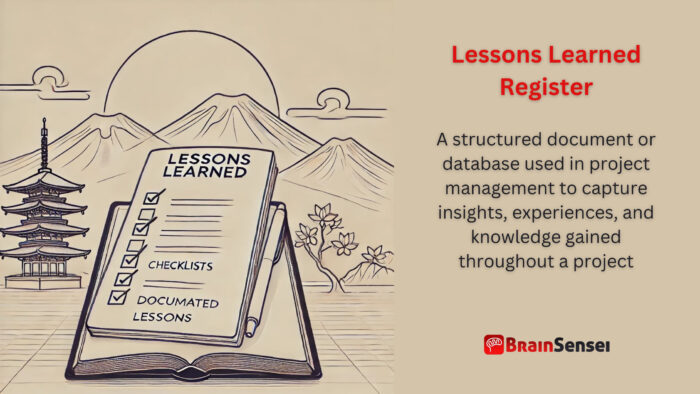
Lessons Learned Register
What is a Lessons Learned Register?
A lessons learned register is a structured document or database used in project management to capture insights, experiences, and knowledge gained throughout a project. It records both successes and challenges, enabling teams to improve future projects by avoiding past mistakes and replicating best practices. This register is essential for organizational learning and continuous improvement.
Key Takeaways
- A Lessons Learned Register documents key insights gained from a project’s execution.
- It helps organizations refine processes and avoid repeating mistakes.
- It supports knowledge sharing across teams and departments.
- This register is typically reviewed at project closeout but can be updated throughout.
- A well-maintained register improves efficiency, quality, and decision-making in future projects.
Understanding the Lessons Learned Register
How It Works
A Lessons Learned Register follows a structured approach to documenting project experiences. It typically includes:
- Project Information: Basic details such as project name, scope, and duration.
- Lessons Learned: Categorize key takeaways into successes, challenges, and recommendations.
- Root Causes & Impact: Analysis of what led to challenges and their effects on the project.
- Actionable Insights: Steps to take to implement improvements.
- Responsible Parties: Identifying stakeholders accountable for implementing lessons in future projects.
Organizations typically collect lessons learned through post-project reviews, surveys, or facilitated team discussions. They then store these insights in a central repository that future project teams can easily access.
Notes
- Teams should update it throughout the project lifecycle, not just at closeout.
- It must be easily accessible to relevant teams to maximize value.
- Should focus on actionable recommendations rather than just recording events.
- Requires structured categorization to ensure usability and searchability.
- Helps meet compliance and governance requirements in regulated industries.
Related Terms
- Project Closeout Report: A formal document summarizing project performance, including lessons learned, financials, and final deliverables.
- Knowledge Management System (KMS): A system that stores and organizes knowledge assets, including lessons learned registers, for future use.
- Retrospective Meeting: A structured team meeting, often used in Agile projects, to discuss lessons learned and areas for improvement.
- Risk Register: A document tracking project risks, their likelihood, impact, and mitigation strategies, which often informs lessons learned.
- Process Improvement Plan: A strategic plan outlining how an organization will enhance workflows based on lessons learned and feedback.
Examples of a Lessons Learned Register in Practice
Construction Industry
The United States government contracted a construction company to build a large bridge connecting two major cities. The project involved multiple subcontractors, extensive permitting processes, and coordination with local governments. Despite thorough planning, several challenges emerged, including delays due to material shortages, unexpected weather conditions, and miscommunication among stakeholders.
The team documented key insights in the Lessons Learned Register throughout the project. One major issue identified was the reliance on a single supplier for concrete, which caused delays when supply chain disruptions occurred. The register recorded the recommendation to diversify suppliers in future projects to mitigate risk.
Additionally, the project faced issues with unclear contractual agreements among subcontractors. The project team noted that future contracts should clearly define roles, responsibilities, and escalation procedures to avoid disputes. Another major lesson learned was the need for enhanced weather contingency planning. Future projects could better handle unexpected delays by analyzing historical weather patterns and incorporating buffer time in schedules.
At the project’s conclusion, the team conducted a structured review and integrated all lessons into the company’s project management framework. When the company later embarked on another significant infrastructure project, it applied these lessons, resulting in smoother execution, fewer delays, and improved budget adherence.
IT & Software Development
A multinational corporation implemented an enterprise resource planning (ERP) system to streamline operations across multiple departments. The project, which lasted two years and had a budget of $50 million, was delayed by employees’ struggles to adapt upon launch, leading to operational disruptions, productivity losses, and widespread frustration.
During the retrospective review, the project team identified key lessons learned and recorded them in the Lessons Learned Register. One critical issue was insufficient end-user training. Despite comprehensive system documentation, employees found the new system complex and unintuitive. The register recommended incorporating hands-on workshops and phased rollouts rather than an immediate company-wide launch in future implementations.
Another lesson documented was inadequate stakeholder involvement during the system design phase. The team did not fully engage department heads, which led to the development of features that did not align with actual business needs. Therefore, the register suggested that future projects create a cross-functional advisory board to address all stakeholder requirements.
The organization applied these lessons two years later when implementing another IT system. By increasing stakeholder engagement and providing extensive training before launch, the company avoided the disruptions experienced in the ERP rollout, demonstrating the tangible value of maintaining a Lessons Learned Register.
Healthcare Industry
A major European hospital expanded its facilities to accommodate a growing patient population. The project included the construction of new operating rooms, patient wards, and an upgraded medical records system. Despite meeting its completion deadline, the hospital’s team documented several challenges during implementation in the Lessons Learned Register.
One significant issue was inadequate coordination between construction teams and hospital administrators. As construction progressed, administrators realized they had obstructed specific critical pathways for patient movement, requiring costly modifications. The Lessons Learned Register documented this oversight and recommended closer collaboration between architects and healthcare professionals in future projects.
Another major challenge was staff resistance to the new electronic medical records (EMR) system introduced alongside the expansion. Many healthcare professionals were reluctant to transition from paper-based records, leading to inefficiencies in patient care. The register captured this issue and recommended a structured change management strategy, including physician-led advocacy and early training sessions to increase adoption rates in future digital transformation projects.
Following the expansion, hospital executives reviewed the Lessons Learned Register and integrated its insights into upcoming projects. Three years later, when a second hospital in the same network expanded, these documented lessons helped the organization proactively address potential issues, resulting in a more efficient transition with fewer disruptions.
Financial Services
A leading Asian bank embarked on a digital transformation initiative to launch an online banking platform. The project aimed to enhance customer experience, provide digital payment options, and integrate AI-driven financial advisory services. However, the initial rollout faced numerous challenges, including security vulnerabilities, low adoption rates, and compliance issues.
During project closure, the team conducted a detailed review and documented all critical insights in the Lessons Learned Register. One major issue was underestimating cybersecurity threats. Within weeks of launch, hackers attempted to exploit vulnerabilities, leading to temporary service outages. The register highlighted the need for more rigorous security testing before future rollouts and recommended involving external cybersecurity firms for penetration testing.
Another lesson documented was the lack of customer awareness about the new platform. Despite significant investment in development, many customers continued using traditional banking services. The register suggested that future projects include a robust customer education campaign, social media engagement, and live demonstrations to encourage adoption.
Three years later, when the bank launched an AI-powered investment advisory tool, it applied these lessons by prioritizing security, conducting extensive customer outreach, and ensuring compliance with financial regulations. As a result, the new initiative achieved much higher adoption rates and a seamless rollout.
Aerospace & Defense
A government space agency conducted a multi-billion-dollar project to deploy a new satellite network for global communications. The initiative faced numerous setbacks, including budget overruns, launch delays, and unexpected technical failures during testing.
The Lessons Learned Register was crucial in documenting insights throughout the project. One key lesson was the importance of redundancy in system design. Early in the project, a critical component failure during testing nearly derailed the timeline. Engineers later recommended designing backup systems for all mission-critical components, and they applied this lesson in future aerospace projects.
Another documented issue was inefficient supplier management. Some vendors failed to meet deadlines, resulting in cascading delays. The register recommended establishing stricter contract enforcement and diversifying suppliers for critical components in future projects.
As the agency embarked on subsequent space missions, it refined processes using the Lessons Learned Register. Implementing these improvements achieved greater efficiency, reduced delays, and enhanced overall project success rates.
These examples illustrate how organizations across diverse industries utilize the Lessons Learned Register to refine their processes, enhance efficiency, and drive continuous improvement. By systematically documenting and applying lessons, businesses and institutions can mitigate risks and increase the likelihood of project success in the future.
Use Cases of a Lessons Learned Register in Different Regions
North America (Transportation & Infrastructure)
A Canadian government agency initiated a multi-year infrastructure project to build an extensive transportation network, including roads, bridges, and tunnels. During the project’s execution, unforeseen regulatory delays and environmental impact concerns caused significant setbacks. The project team meticulously documented these issues in the Lessons Learned Register.
One of the main insights was the importance of proactive engagement with regulatory bodies and environmental organizations. The project team recommended early collaboration with government agencies and stakeholders to streamline approvals in future initiatives. Additionally, the project faced cost overruns due to fluctuating material prices, leading to the suggestion of long-term supplier agreements and dynamic budgeting models.
Three years later, when a similar infrastructure project commenced, these lessons were applied, resulting in a 25% reduction in approval time and significant cost savings.
Europe (Financial Services)
A leading bank in the United Kingdom launched a digital banking platform to improve customer experience and operational efficiency. However, the initial rollout encountered multiple challenges, including technical failures, compliance issues, and low customer adoption rates.
The Lessons Learned Register detailed these problems. The primary recommendation was to conduct phased rollouts with controlled user testing rather than simultaneously launch system-wide changes. Additionally, the project highlighted the importance of more apparent regulatory alignment before deployment, prompting the company to establish dedicated compliance teams for future projects.
When the bank later introduced a mobile investment advisory service, these lessons ensured a smoother transition, with significantly improved customer satisfaction and fewer technical issues.
Asia (Manufacturing Industry)
A large electronics manufacturer in Japan adopted advanced automation technologies to improve production efficiency. Despite rigorous planning, integration issues with existing systems led to significant downtime, affecting overall productivity.
The Lessons Learned Register helped document the challenges, particularly the need for better vendor collaboration during system implementation. To ensure smooth adoption, the team recommends conducting extensive pilot testing and involving frontline workers in the technology selection process.
Five years later, the company applied these lessons when implementing AI-driven robotics, leading to a more seamless transition and a 40% increase in production efficiency.
Africa (Renewable Energy)
A South African energy company launched a large-scale solar farm to enhance renewable energy capacity. However, the project encountered unexpected logistical challenges, including difficulty transporting materials to remote locations and a lack of skilled labour for specialized installations.
The Lessons Learned Register documented the need for more thorough logistical planning and earlier workforce training. Based on these insights, the company established partnerships with local training institutions to develop skilled labour pools and preemptively mapped transportation routes for future projects.
When the company expanded its solar energy initiatives two years later, these lessons helped streamline operations, reducing project timelines by 30%.
Middle East (Oil & Gas Industry)
A significant oil and gas company in the Middle East undertook an ambitious offshore drilling project. Despite its high potential, supply chain disruptions and geopolitical uncertainties delayed the project.
The Lessons Learned Register highlighted the necessity of supply chain diversification and risk mitigation strategies, such as sourcing critical components from multiple vendors and maintaining emergency stockpiles.
The company implemented these recommendations in a subsequent project, ensuring uninterrupted operations and improving overall efficiency.
These use cases demonstrate how the Lessons Learned Register is a powerful tool across industries and regions, enabling organizations to refine processes, mitigate risks, and enhance future project outcomes.
Best Practices for Implementing a Lessons Learned Register
Continuous Documentation Throughout the Project Lifecycle
One of the most effective ways to ensure a valuable Lessons Learned Register is to document insights throughout the project rather than waiting until project closure. This technique allows teams to capture real-time observations, making the register more accurate and actionable.
Standardized Format of Lessons Learned Register for Ease of Use
Teams should structure the register in a consistent format to maximize usability. Key categories must include project details, lessons learned, impact analysis, and actionable recommendations. Standardization ensures consistency across projects and enhances knowledge sharing.
Encouraging Team Participation
A Lessons Learned Register is most effective when team members actively contribute their insights. Fostering an open culture where employees feel comfortable sharing successes and failures fosters continuous improvement.
Accessibility and Knowledge Sharing
Project teams should store the register in a centralized, easily accessible location, such as a shared database or knowledge management system. By doing so, future project teams can readily refer to past experiences and apply relevant lessons.
Implementing Lessons into Future Projects
Capturing insights is only valuable if they are applied. Project managers should incorporate lessons learned into risk assessments, planning processes, and training programs for future projects to drive meaningful improvements.
Leadership Support and Accountability
Senior leadership should actively endorse the Lessons Learned Register and hold teams accountable for leveraging documented insights. This approach will reinforce its importance and integrate it into organizational decision-making.
Conducting Post-Project Reviews
Teams should schedule dedicated post-project review meetings to analyze key takeaways and adequately document them. Engaging all stakeholders in these discussions leads to a more comprehensive Lessons Learned Register.
Leveraging Technology for Automation and Analysis
Many organizations use digital tools to enhance their Lessons Learned Register. AI-driven analytics can help identify patterns across multiple projects, providing deeper insights into recurring challenges and successful strategies.
Implementing these best practices can help organizations create a continuous learning and improvement culture, enhancing project success rates and operational efficiency.
Lessons Learned Register: Common Mistakes and Issues
Failure to Document Lessons Regularly
One of the most common mistakes is waiting until the end of a project to document lessons learned. This mistake often results in forgotten details and missed opportunities for improvement. Project teams should record lessons throughout the project lifecycle to mitigate this issue and ensure fresh and accurate insights.
Lack of Standardization
Many organizations struggle with inconsistent documentation formats, making it difficult to compare and apply lessons across projects. Standardizing the Lessons Learned Register with specific categories, such as issue description, root cause, and recommended actions, improves usability and effectiveness.
Limited Accessibility and Knowledge Sharing
A Lessons Learned Register is only valuable if easily accessible to future project teams. Many organizations fail to integrate their registers into a centralized knowledge management system, causing critical insights to be lost or underutilized. To maximize the register’s benefits, ensure open access and promote active team use.
Failure to Implement Lessons
Recording lessons is meaningless if they are not applied. A common issue is documenting insights without integrating them into project planning, risk assessments, or training programs. To address this, organizations should establish processes for reviewing and incorporating lessons into future projects.
Leadership Disengagement
If leadership does not prioritize the Lessons Learned Register, teams often treat it as a low-priority activity. Therefore, senior management must actively support the initiative and set expectations for teams to regularly review and apply documented lessons.
Overlooking Positive Lessons
While documenting mistakes and failures is crucial, many organizations neglect to capture successful strategies. Recognizing and replicating best practices across projects can enhance efficiency and success rates.
Lack of a Continuous Improvement Culture
Teams should not treat a Lessons Learned Register as a static document but as part of a broader continuous improvement strategy. Encouraging a culture where employees feel empowered to share insights and innovate based on past experiences strengthens the effectiveness of lessons learned.
By addressing these common mistakes and proactively improving Lessons Learned Registers, organizations can enhance project outcomes, reduce risks, and foster a culture of continuous learning and innovation.
Lessons Learned Register: Frequently Asked Questions (FAQs)
What is the primary purpose of a Lessons Learned Register?
The primary purpose is to document project experiences, both positive and negative, to improve future project outcomes.
How often should a Lessons Learned Register be updated?
Ideally, it should be updated continuously throughout the project lifecycle, not just at the end.
Who is responsible for maintaining the Lessons Learned Register?
The project manager or a designated knowledge management team is typically responsible for updating and managing the register.
How does a Lessons Learned Register benefit an organization?
It helps organizations avoid repeating mistakes, improves efficiency, enhances team collaboration, and strengthens project success rates.
What is the difference between a Lessons Learned Register and a Project Closeout Report?
A Lessons Learned Register focuses specifically on project insights and knowledge gained. In contrast, a Project Closeout Report comprehensively summarizes the entire project, including financials, performance metrics, and final deliverables.
Additional Resources
- The Project Manager’s Guide to Lessons Learned: Turning Insights Into Action for Project Success
- How to Capture Lessons Learned in Project Management
Preparing for a PMI certification?
- Exam Prep Courses: PMP®, CAPM®, and PMI-ACP®
- Exam Simulators: PMP®, CAPM®, PMI-ACP®, PMI-PBA®, PMI-RMP®, PMI-SP®, PgMP®, and PfMP®
- Professional Development Units (PDUs): 15, 30, and 60 PDU Bundles



